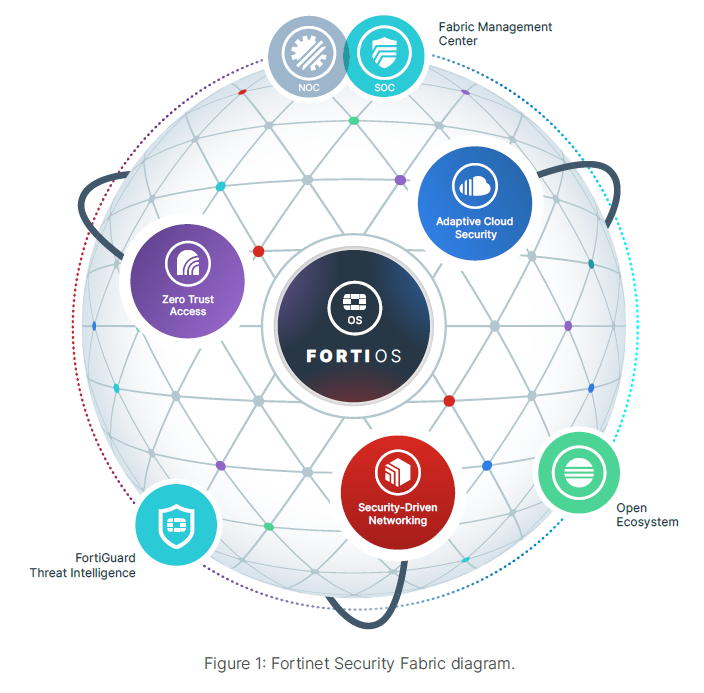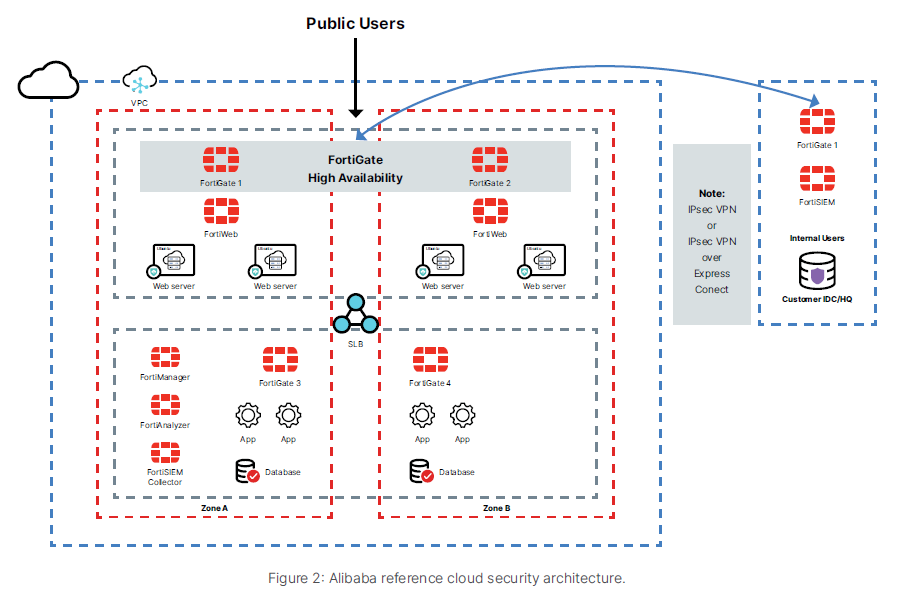83% of enterprise workloads will be in the cloud by 2020, with 63% of IT professionals listing security as their biggest concern about this trend. [1]
Fortinet and Alibaba are working together to bring best-in-class cybersecurity to organizations using Alibaba Cloud for digital transformation (DX) and global e-commerce. The Fortinet Security Fabric provides broad coverage across the attack surface—from the Internet of Things (IoT) to the cloud—while integrating each of the security elements and automating threat protection. The Security Fabric offers organizations advanced, extensible threat protection that spans clouds and data centers and provides comprehensive security tools supported by the industry's leading threat research team backed by a global network of sensors and machine-learning (ML) technology. It also delivers centralized management and analytics, automation, and intent-based segmentation that enables organizations to reduce risk, even in dynamically changing networks.
Over 80% of enterprises have adopted two or more public clouds, with nearly two-thirds using three or more. [2]
The Fortinet Security Fabric protects business workloads across on-premises data center and cloud environments, including multilayered security for born-in-the-cloud applications. The Security Fabric supports a variety of common Alibaba Cloud-based use cases.
Applications being built in or migrated to the cloud need to be protected against traditional internet-borne threats, as well as from new threats that are introduced via application programming interfaces (APIs) that propagate across workloads.
The combination of inline protection for north-south traffic, host-based protection for east-west traffic, and protection for cloud API and configuration risks offers the tightest security solution for the cloud. FortiGate VM protects virtual cloud networks from internet-based threats and provides secure multi-cloud connectivity. FortiClient endpoint protection on virtual machines (VMs) extends security within the cloud to ensure security policy compliance. FortiCASB Cloud protects from unwanted or unsupervised configurations at the cloud-account level.
Nearly one-third of organizations say it is difficult to get a holistic perspective on external threats due to disaggregation of threat intelligence. [3]
Secure connectivity between cloud environments and data centers is requisite for cloud computing projects. Often the need for secure communications leads to limited insight into the threats that may travel with network traffic. Meanwhile, complex, multi-cloud deployments expand the attack surface and create challenges in terms of establishing and enforcing consistent security policies. Securing hybrid clouds requires a security fabric that will work across data centers and clouds to provide single-pane-of-glass management and analytics.
FortiGate next-generation firewalls (NGFWs) and cloud security solutions offer best-of-breed secure connectivity, network segmentation, and application security for hybrid-cloud deployments. These solutions connect through a high-speed VPN tunnel to provide centralized, consistent security policy enforcement. FortiGate VMs deployed in the public cloud can securely communicate and share consistent policies with FortiGate NGFWs of any form factor—whether provisioned across clouds or in a private data center.
Relying on static trust zones for users, devices, and applications is no longer sufficient when it comes to threat protection. In particular, for cloud deployments, network segmentation based on static IP addresses is unable to keep up with the dynamic nature of today's networks. To address this issue, FortiGate VMs provide intent-based segmentation, which builds access rules and network segments based on business logic. Intent-based segmentation then adjusts rules dynamically in response to a continuous trust assessment of users, devices, and applications. For intent-based segmentation in the cloud, FortiGate VMs leverage metadata or tags associated with resources across multiple clouds to enforce security policies based on business-access needs.
Fortinet leverages the multiregional and global presence of top cloud infrastructure providers to deploy centralized and global security management and analytics systems in the cloud. FortiManager VM, FortiAnalyzer VM, and FortiSIEM VM can all be deployed in the cloud and all can scale to monitor and secure vast, multi-cloud deployments. FortiManager integrates visibility and control of FortiGate NGFWs across on-premises and cloud environments into a single pane of glass, while FortiAnalyzer aggregates and reconciles threat intelligence across the Fortinet Security Fabric. The latter is assessed based on government and industry regulations as well as security standards, enabling organizations to identify vulnerabilities in real time and proactively detect, prevent, and respond to threats.
The Fortinet Security Fabric provides Alibaba Cloud users with the ability to apply universal policies throughout their multi-cloud infrastructures for consistent policy enforcement and global visibility. The Security Fabric offers deep, multilayer protection and operational benefits for securing web applications over Alibaba Cloud and for managing global security infrastructures from the cloud.
The value proposition of Alibaba Cloud plus Fortinet Security Fabric includes:

The Fortinet Security Fabric secures traffic, data, and applications while increasing confidence in Alibaba Cloud environments. All Fortinet cloud products are based on Fortinet VM form factors. And licenses purchased from a Fortinet channel partner for VMs are transferrable across platforms. For example, using a bring-your-own-license (BYOL) model, the same VM license for FortiGate VM on VMware will work for FortiGate on the Alibaba Cloud platform. In addition, FortiGate, FortiAnalyzer, and FortiManager are all available in the Alibaba Marketplace.
The Fortinet Security Fabric for Alibaba Cloud includes the following Fortinet solutions:
Protecting organizations from the onslaught of advanced, constantly evolving threats is a difficult undertaking. The combination of Alibaba Cloud and the Fortinet Security Fabric provides organizations with the ability to extend security visibility and control from the data center to the cloud, from users and devices to the wireless access point. Multilayered security, intent-based segmentation, and ML-enabled security capabilities, which are a key foundation of the Security Fabric, form a comprehensive shared responsibility model that streamlines operations and policy management for improved security life-cycle management. Plus, the combination of Alibaba Cloud and the Fortinet Security Fabric gives organizations a scalable security platform with low total cost of ownership.

Alibaba Cloud Launches The 2022 Create@ Global Startup Contest to Empower Malaysian Tech StartUps

1,346 posts | 475 followers
FollowAlibaba Cloud Community - August 19, 2022
Marketplace - February 21, 2019
Alibaba Clouder - February 11, 2019
Marketplace - August 17, 2020
JawnLim - April 24, 2023
Marketplace - August 18, 2020

1,346 posts | 475 followers
Follow Security Center
Security Center
A unified security management system that identifies, analyzes, and notifies you of security threats in real time
Learn More Security Solution
Security Solution
Alibaba Cloud is committed to safeguarding the cloud security for every business.
Learn More Security Overview
Security Overview
Simple, secure, and intelligent services.
Learn More Cloud Hardware Security Module (HSM)
Cloud Hardware Security Module (HSM)
Industry-standard hardware security modules (HSMs) deployed on Alibaba Cloud.
Learn MoreMore Posts by Alibaba Cloud Community